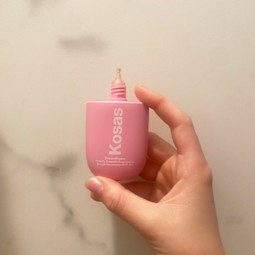Found: The 19 Best Natural Sunscreens Of 2024 — All Tried & Tested By Beauty Pros
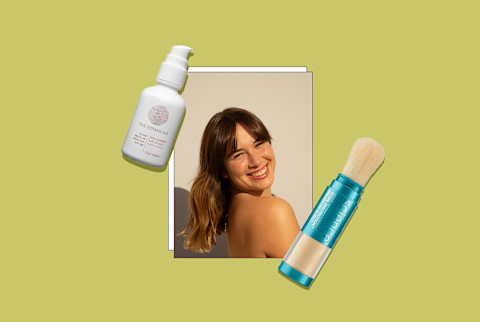
Best natural sunscreens of 2024
When was the last time you got jazzed about sunscreen? Mine was this morning! I’ve been testing out the new crop of sunscreens on the market in preparation for this article, and let me tell you: sunscreen is better than it’s ever been. I’ve been just so thoroughly impressed with so many sensorily stunning numbers, that I’ve been having trouble deciding which one to apply as I get ready.
So if you’re looking for a new option—one that you actually want to apply, not feel obligated to—you’re in the right place. Below, you’ll find the very best natural (or mineral) sunscreens available right now. All are tried, tested, and vetted by the mbg beauty team, derms, and real users.
Finally, it’s time to start loving sun protection.
What is natural sunscreen?
“Natural sunscreen” is not a regulated term. There is no agreed-upon, well-set definition of what it means in the beauty industry either. So what are we even talking about in this article? On this list you’ll find sunscreen options that utilize mineral-blockers, such as zinc oxide and titanium dioxide. Usually when people talk about “natural sunscreen” what they actually mean is “mineral sunscreens.”
I suspect that many equate mineral or physical blockers with “natural” because the alternative SPF active ingredients are classified as “chemical.” And in the beauty space, there’s often a false dichotomy between chemical and natural. (We explain the actual difference between mineral and chemical sunscreen in the section below, if you’re curious.) For the record, even natural things are chemicals—for example, water—so this distinction isn’t warranted, but alas.
In addition to using mineral active ingredients, we also prioritized natural ingredients elsewhere in the formula—so in these options you’ll find botanical oils, butters, and extracts that can support skin health.
However, like most modern day formulas, the sunscreens on this list are typically a blend of both lab-derived ingredients and natural extracts. (Very few commercial products are 100% natural.) So unless otherwise indicated, assume that these formulas are a blend of the two, but with an emphasis on the natural end of the spectrum.
Best natural sunscreens of 2024
Best face (hydrating): Relevant Skin One & Done Everyday Cream SPF 40
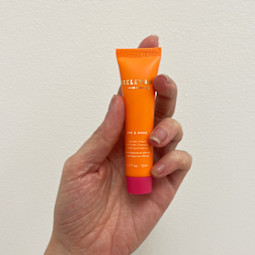
Pros
- Suitable for almost all skin tones
- Works well alone or under makeup
Cons
- Slight odor inherent to the ingredients, but I wouldn’t say it’s a deal breaker
Active ingredients:
Zinc oxideTitanium dioxideSPF:
40Considerations:
Cruelty freeVeganFragrance freeMineral oil freeIngredient highlights:
SqualaneHyaluronic acidApple fruit extractOat extractGreen teaNiacinamidePlum oilBest for:
FaceThis four-in-one formula moisturizes skin using a blend of squalane, hyaluronic acid, green tea, oat extract, plum oil, niacinamide, and a host of antioxidants. Thanks to its nutrient dense profile, it checks all the boxes for a facial product: It provides broad spectrum UVA/UVB protection, antioxidant support, lipids and emollients to support the barrier, and humectants to hold water.
What our reviewer says:
This is a stacked formula—so many skin-supporting ingredients I look for in a product. I love that it’s loaded with antioxidants so it can fight environmental stressors, alongside providing UV protection. I tested out a sample size (pictured) but will be getting the full sized immediately.
Best face (brightening): OleHenriksen Banana Bright Mineral Sunscreen SPF 30

Pros
- Peachy tone allows for more universal wearability
- Provides instant brightening with the banana powder pigment, as well as long-term brightening with antioxidants
Cons
- Only SPF 30 if you stick to 50 or higher
- Contains fragrance if you’re sensitive to scent
Active ingredients:
Zinc oxideSPF:
30Considerations:
Cruelty freeVeganMineral oil freeIngredient highlights:
NiacinamideVitamin CAloe veraBest for:
FaceThis luminous formula instantly brightens skin with “banana powder inspired pigments,” which basically just means that it provides a soft-focus glow that’s universally flattering. But it’s not just a superficial boost, it uses the power of niacinamide and ascorbic acid (vitamin C) to brighten tone, help fade dark spots, and protect the skin from further damage by neutralizing free radicals. All that, plus broad-spectrum UV protection.
What our reviewer says:
I fell for this sunscreen hard—it instantly smoothes out my complexion and provides the perfect glow for a fresh face. I also wear it under makeup, and it plays well with several of my foundation formulas. I love the finish so much, I’d be tempted to wear it daily even if it didn’t give me sun protection!
Best face (premature aging): BeautyStat Universal C Skin Refiner SPF 50 + Mineral Sunscreen

Pros
- Contains the the most potent dosage of vitamin C according to clinical data
- Broad spectrum SPF 50 is a high amount of sun protection
Cons
- Contains silicones if you’re one to avoid those
- Pricey
Active ingredients:
Zinc oxideConsiderations:
Cruelty freeFragrance freeIngredient highlights:
SqualaneVitamin CBest for:
FaceFormulated by all-star cosmetic chemist Ron Robinson (a favorite source among beauty editors and insiders), this mineral sunscreen is a powerhouse of antioxidant protection. Made with a whopping 20% vitamin C, this is for those who are serious about sun spots, fine lines, and other signs of premature aging. Not only does vitamin C have an accountability to help brighten tone, but it also protects and supports collagen production.
What our reviewer says:
“I’ve been experimenting with other antioxidant serums in my routine, but I do miss a trusty vitamin C. Good news! BeautyStat makes it easy to infuse the classic skin brightener into my regimen with this two-in-one formula. Sunscreen and vitamin C go together like peanut butter and jelly; and this one features 20% ascorbic acid along with zinc oxide to protect against photoaging and fade dark spots. Ron Robinson, cosmetic chemist and founder of the brand, recommends mixing it with his Pro Moisture Boost Cream for a super-hydrating base. Try the trick and thank me later.” — mbg beauty editor Jamie Schneider
Best face (mature skin): Paula's Choice Defense Essential Glow Moisturizer SPF 30
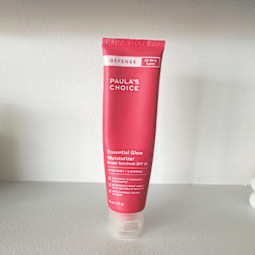
Pros
- Contains both plant and vitamin derived antioxidants
- Protects against pollution (another cause of premature aging)
Cons
- Complaints of a white cast
Active ingredients:
Zinc oxideTitanium dioxideSPF:
30Considerations:
Cruelty freeVeganFragrance freeIngredient highlights:
NiacinamideVitamin CLicorice root extractKiwi extractArgan oilResveratrolPeptidesBest for:
FaceThis uses 12 antioxidants (twelve!) that target a wide spectrum of mature skin concerns. Vitamin C can help improve skin elasticity and firmness through collagen support. Niacinamide helps soothe sensitivity and bolsters the barrier. Licorice root targets dark spots. Resveratrol enhances skin cell rejuvenation. I could go on, but you get the picture. This is all infused with broad-spectrum SPF 30.
What our reviewer says:
“I have high standards for a glow-inducing sunscreen, and I'm happy to report that this formula ticks all the boxes. When you squeeze out the product, you can literally see the illuminating tints swirling in the creamy base—that's a marker of a good, radiant sunscreen. It has become my go-to for no-makeup days when I want just a teeny bit of glow without appearing oily.” — Schneider
Pros
- Non-comedogenic
- Peach tone for more universal wearability
- Chebula and astaxanthin are powerful antioxidants that soothe the skin and fight free radicals
Cons
- Not as hydrating as other options on the list
Active ingredients:
Zinc oxideSPF:
30Considerations:
Cruelty freeVeganFragrance freeMineral oil freeIngredient highlights:
ChebulaAstaxanthinBest for:
FaceLots of folks with oil- or acne-prone skin complain about sunscreen—it makes them break out, clogs pores, and makes the complexion even more shiny. The hard truth is that those with acne and clogged pores need SPF even moreso: Sun damage can worsen acne scars and make pores even bigger (UV radiation breaks down collagen, which collapses pore walls). This option was formulated specifically with breakout prone skin in mind. It’s made with all non-comedogenic ingredients (including nixing pore-clogging waxes), plus soothing chebula and astaxanthin.
Best for the skin & planet: Thrive Natural Mineral Face Sunscreen for Sensitive Skin SPF 30
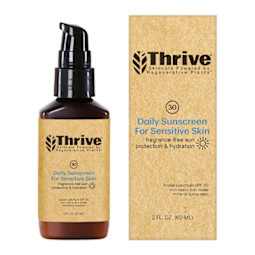
Pros
- Regenerative farming actually yields more potent antioxidant power in plants
- The brand’s business model and supply chain helps farmers restore degraded soil and improve livelihood
Cons
- Can cause makeup to pill, based on the foundation formula
Active ingredients:
Zinc oxideSPF:
30Considerations:
Cruelty freeVeganFragrance freeMineral oil freeIngredient highlights:
FierilloCoralilloPentavitinWakame kelpTazman pepperBest for:
FaceBlending together a unique blend of potent botanicals, this helps restore the skin barrier while protecting it from further damage from UV radiation. Pentavitin, wakame kelp, and tazman pepper can help hydrate and strengthen the skin—while fierrilo and coralillo provide antioxidant support.
What our reviewer says:
I have a deep love for Thrive Natural Care—not just because they make fantastic sunscreen, but because their mission of regenerative farming practices is such a worthwhile endeavor. I have sensitive skin, so I opt for this option, but all of their sunscreens are great formulas.
Pros
- Climate & plastic neutral
- Members of 1% for the Planet
Cons
- Not water resistant
- To get to SPF 30, 20% zinc oxide was required. To help alleviate the brand used an “an advanced zinc dispersion technology” but there still might be a white cast for some
Active ingredients:
Zinc oxideSPF:
30Considerations:
Cruelty freeVeganFragrance freeIngredient highlights:
SqualaneHyaluronic acidNiacinamidePanthenolAlgea extractVitamin EBest for:
BodyThis uses face quality skin care ingredients for the neck down (well, you could use it on your face, too, but it’s better suited for the body). Squalane, hyaluronic acid, niacinamide, panthenol, and algae extract strengthen barrier function, plump the skin, and smooth out fine lines. A tip for applying a formula with this much zinc oxide: Skip the body lotions, and use this as your moisturizer. Apply it all over, and let it sit on the skin while it dries down. Then press and gently rub it into the skin to finish.
What our reviewer says:
“I have both the travel and full-sized version of this sunscreen—personally, I like to use the full-sized formula on my body, as the whipped, airy texture requires a bit more spreading. I will admit that it does leave a slight white cast on me, and I’m pretty fair. But it’s a small price to pay for a sunscreen formula this good: Hyaluronic acid, niacinamide, algae, and panthenol plump fine lines, even tone, and protect against premature aging.” — Schneider
Pros
- Water resistant for up to 80 minutes
- Comes in SPF 30 and 70 as well
Cons
- Contains PEGs and silicones if you avoid those
- Not vegan or cruelty free
Active ingredients:
Zinc oxideTitanium dioxideSPF:
50Ingredient highlights:
SqualanePanthenolAlgea extractVitamin EKakadu plumEucalyptusBest for:
BodyThis classic sun care brand is beloved for a reason—the budget-friendly formulas deliver quality ingredients and a consistent experience. Their mineral offerings use a blend of both zinc oxide and titanium dioxide, as well as a cocktail of Australian botanicals for skin support. For example kakadu plum is high in vitamin C and eucalyptus lends the formula a refreshing scent. It’s further buffered with shea butter, glycerin, and squalane. Plus, it has a slight tint to it that helps alleviate chalky cast.
Best face & body hybrid: La Roche-Posay Anthelios Body and Face Gentle-Lotion Mineral Sunscreen SPF 50

Pros
- Water-resistant for up to 80 minutes
- Tested on sensitive skin
Cons
- Not vegan or cruelty free
- Contains PEGs and silicones if you avoid those
- Can leave a white cast
Active ingredients:
Zinc oxideTitanium dioxideSPF:
50Considerations:
Fragrance freeIngredient highlights:
Senna alataSilicaBest for:
FaceBodyThis derm-favorite brand makes an excellent assortment of sunscreens (both mineral and chemical, face and body, tinted and not). This option is perhaps one of their most popular, which is 100% mineral and works for the face and body. Grab this when you’re headed out for a day in the sunshine, and you know you’ll want to be re-applying all over.
What our reviewer says:
I have used many sunscreens from La Roche-Posay—I especially love taking them on vacations—and this one's a classic. The mineral formula is thick however, so be prepared to work it in.
Pros
- Pediatrician-tested and hypoallergenic
- Water resistant for up to 80 minutes
- Contains a host of antioxidant rich botanical extracts
Cons
- Rich texture isn’t for everyone – opt for the spray version for a lighter consistency
Active ingredients:
Zinc oxideTitanium dioxideSPF:
50Considerations:
Cruelty freeVeganFragrance freeMineral oil freeIngredient highlights:
Sunflower seed oilShea butterBest for:
FaceBodyWhen you’re looking for a suitable option for the whole family, kids included, opt for formulas that are gentle and safe for sensitive skin. This blend has a base of hydrating shea butter and sunflower seed oil, so it goes on soft and easy.
Best tinted (medium to dark): UnSun Everyday Mineral Tinted Face Sunscreen SPF 30
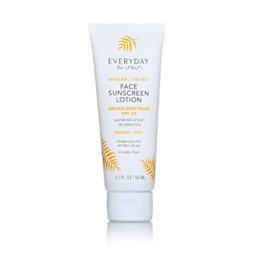
Pros
- High-quality ingredients at a very reasonable price
- Vitamin C can help support collagen production
- Green tea & aloe vera are very soothing
Cons
- Complaints of the smell
Active ingredients:
Zinc oxideTitanium dioxideSPF:
30Considerations:
Cruelty freeVeganFragrance freeIngredient highlights:
Green teaVitamin CAloe veraLinseed oilPlankton extractEvening primrose oilBest for:
FaceAn award-winning sunscreen with a dedicated following, this face cream comes in two tints: fair to medium and medium to dark. The formulas blend in effortlessly (for proof, peek at the brand's photo evidence). It can act as a primer under makeup or wear it all on its own for a more natural look—it will help smooth texture and minimize discoloration.
Best tinted (very fair to light): Suntegrity 5-in-1 Natural Moisturizing Face Sunscreen Tinted
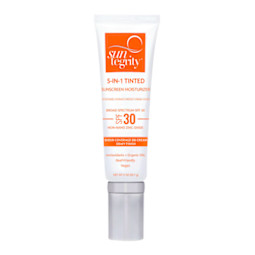
Pros
- Pomegranate has been shown to fade dark spots and help protect skin against UV-induced sun damage
Cons
- Not a wide range of shades
- Gives a dewy sheen to your skin—so not for those wishing for a matte look
Active ingredients:
Zinc oxideTitanium dioxideSPF:
30Considerations:
Cruelty freeVeganFragrance freeMineral oil freeIngredient highlights:
Green teaAloe veraPomegranateCucumberJojoba oilBest for:
FaceThis silky fluid slips onto the skin, coating it in a light wash of moisture. The formula’s infused with botanicals like green tea, aloe, pomegranate, and cucumber–making the texture extremely lightweight.
What our reviewer says:
I love using this for bare-faced days—it gives me my sun protection, and a subtle tint to even out my skin tone. It’s light and dewy, so it really looks like you’re wearing nothing. Your skin, just smoother and protected.
Best tinted (all around): Odacité Flex-Perfecting Tinted Mineral Drops SPF 50

Pros
- 5 diverse shades that blends to color-match your skin tone
- High SPF with broad-spectrum coverage
Cons
- Thin texture, so you need to build and layer it to get full coverage
Active ingredients:
Zinc oxideSPF:
50Considerations:
Cruelty freeVeganFragrance freeMineral oil freeIngredient highlights:
SqualaneGreen teaNiacinamideChamomileCalendulaBest for:
FaceThis tinted number is the epitome of skin care-make up hybrid. The texture feels like you’re applying serum—and with the ingredient profile, you may as well be: The green tea, niacinamide, squalane, chamomile, and calendula can all support the skin in various ways, from strengthening the barrier to fighting free radicals. The coverage is light to medium, but it can build to something with more coverage if you’re using it as more of a foundation product.
What our reviewer says:
This has the consistency of a light oil or serum, but then dries down to a satin finish (read: not too shiny, but not flat). I used the palest shade—which looked too light upon first application—but then blended in seamlessly. I get redness on my cheeks and nose, and felt this helped calm those areas so my complexion looked more consistent throughout the day. It’s fine on its own, but on days when I wanted full coverage I used it as a primer for a liquid foundation and it didn’t pill.
Best derm-recommended: ISDIN Eryfotona Actinica Sunscreen SPF 50

Pros
- High SPF amount
- The lightweight formula makes it easy to apply
Cons
- Not vegan or cruelty free
- Contains undisclosed fragrance and PEGs
Active ingredients:
Zinc oxideSPF:
50Ingredient highlights:
PhotolyaseBest for:
FaceThe star of the show in this formula is the photolyase, an enzyme that helps repair damage from UV exposure. The enzyme comes from plankton, and essentially cleans up damage done in the cells. This helps protect the skin two-fold! It’s beloved by derms, estheticians, and beauty pros alike. Recently, board-certified dermatologist Jeanine Downie, M.D. told me it was one of her favorite SPFs.
Best budget: Andalou Naturals Deep Hydration Daily Shade + Blue Light Defence SPF 30

Pros
- 99% nature derived
- Contains organic ingredients
- Packaging is made with 50% PCR
Cons
- Slight chalky feel, but nothing too dramatic
Active ingredients:
Zinc oxideSPF:
30Considerations:
Cruelty freeVeganMineral oil freeIngredient highlights:
Hyaluronic acidAloe veraSunflower seed oilShea butterApple stem cellsEctoinPacked with natural and organic ingredients, this lotion feeds the skin humectants, emollients, antioxidants, fatty acids, and amino acids for a full hydration experience. We’re particularly impressed by the plant stem cells (which help support skin rejuvenation) and the ectoin (for epidermal barrier function).
What our reviewer says:
“Deep Hydration is right—this sunscreen is brimming with skin-plumping humectants. I notice my face looking more supple within minutes. It’s also a pretty generous size (2.7 ounces), yet you can still pop it in your carry-on when traveling. Suffice it to say, this will be my summer go-to.” — Schneider
Pros
- Pillowy, silky texture that keeps skin hydrated all day
Cons
- Pricey
Active ingredients:
Zinc oxideSPF:
31Considerations:
Cruelty freeVeganFragrance freeMineral oil freeIngredient highlights:
Plum oilZonaria tournefortii extractThis little tube of sunscreen has amassed a cult following: The texture is that good. It’s made with the brand’s signature plum oil and Plum Superfruit Complex, which help protect against DNA damage. It’s topped with Zonaria tournefortii extract, which is a seaweed extract that helps smooth wrinkles and fade dark spots
What our reviewer says:
A cushiony delight! This plush sunscreen has the softest texture that melts into skin, and feels amazing all day. I have sensitive skin, and found this to be very soothing—but if you have oil-prone skin, it’s non comedogenic. Not for nothing, but I know that it’s the go-to sunscreen for several beauty insiders.
Pros
- Tested by Valisure a third-party lab, to ensure it’s free of benzene contamination
- 70% organic formula
- Water resistant for 80 minutes
Cons
- Can leave a white cast — the brand makes chemical sunscreens (also tested for benzene) should you want to find a more transparent option
Active ingredients:
Zinc oxideSPF:
30Considerations:
Cruelty freeFragrance freeMineral oil freeIngredient highlights:
Aloe veraAlgea extractSunflower seed oilShea butterJojoba oilCoconut oilAs easy as sprayable sunscreen makes application, it’s come under scrutiny lately as many of the popular options on the market have been exposed as contaminated with the carcinogen benzene. Well, you don’t have to swear them off entirely—just make sure you find one that’s tested. Coola notes that they use a third-party tester to make sure theirs is benzene free. Not only that, but the formula uses 70% organic ingredients (like algae extract, aloe, and coconut oil) and mineral blockers. This is the highest quality spray sunscreen on the market—from the makers of some of the best SPFs out there.
Best brush on: ColoreScience Sunforgettable Total Protection Brush On Shield SPF 50

Pros
- High SPF
- Can multitask and use it several locations (scalp, face, neck, chest, hands)
- Great for reapplication
- Uses antimicrobial bristles
Cons
- Pricey
Active ingredients:
Zinc oxideTitanium dioxideSPF:
50Considerations:
Cruelty freeFragrance freeIngredient highlights:
Hyaluronic acidOak wood extractGrapeseed extractBest for:
FaceBodyBrush on options are fantastic for mid-day reapplication, as it can almost act like a setting powder. This one is nothing but the good stuff (although it comes with a price tag to prove it.) “It's all-mineral, hypoallergenic and non-comedogenic, and the bristles of the brush are antimicrobial. Free of parabens, phthalates, sulfates, oil and fragrance. Protects from UVA, UVB, infrared, blue light and pollution with non-nano zinc oxide, iron oxides and antioxidants,” board-certified dermatologist Hadley King, M.D., once told us.
What our reviewers say:
But Schneider and I have tested this formula, and we love that it can double as a scalp sunscreen. She notes the “lightweight, airy consistency,” and I love that it’s an effective multitasker: It’s a setting powder, a midday shine mattifier, dry shampoo, scalp sunscreen—you can basically tap this all over.
Pros
- Hyaluronic acid plumps the skin
- Ceramides and peptides smooth wrinkles
- Allantoin helps soothe any sensitivity
Cons
- Often sells out
Active ingredients:
Zinc oxideSPF:
40Considerations:
Cruelty freeFragrance freeMineral oil freeIngredient highlights:
Hyaluronic acidCeramidesPeptidesAllantoinBest for:
FaceOne of the most common frustrations with sunscreen is that it pills under makeup. But this option acts almost like a primer: prepping the skin for foundation with a peachy hue that creates a luminescent base. It’s infused with several plumping ingredients too, so it helps create a smooth, soft canvas all day long.
What our reviewers say:
“This SPF goes on like a super hydrating skin tint, with no greasy residue or white cast left behind. The slight tint adds a glow while decreasing the ghosty complex that often comes with mineral formulas. Not to mention, it's packed with ceramides, peptides, and hyaluronic acid, providing more benefit than just sun protection.” — mbg assistant beauty editor Hannah Frye
“While zinc oxide is notoriously difficult to blend, this formula comes with a peachy-pink hue to help neutralize the cast. And thanks to ceramides, peptides, hyaluronic acid, and allantoin, it doesn’t just sit well under makeup—it actually enhances it by leaving behind a dewy, plump film over your pores. From a skin care-first makeup brand like Kosas, I would expect nothing less.Is $40 a bit pricey for a sunscreen? Perhaps, but if you’ve yet to find a formula you’ll actually commit to, I’d wager this one will make you genuinely excited to slather on.” — Schneider
Comparing the best natural sunscreens
| Name | Superlative | Price | SPF | Active ingredient | Face or body |
|---|---|---|---|---|---|
| Relevant Skin One & Done Everyday Cream SPF 40 | Best face (hydrating) | $30 | 40 | Zinc Oxide & Titanium Dioxide | Face |
| OleHenriksen Banana Bright Mineral Sunscreen SPF 30 | Best face (brightening) | $35 | 30 | Zinc Oxide | Face |
| BeautyStat Universal C Skin Refiner SPF 50 + Mineral Sunscreen | Best face (premature aging) | $85 | 50 | Zinc Oxide | Face |
| Paula's Choice Defense Essential Glow Moisturizer SPF 30 | Best face (mature skin) | $33 | 30 | Zinc Oxide & Titanium Dioxide | Face |
| True Botanicals Skin Barrier Sun Shield SPF 30 | Best face (oil-prone skin) | $65 | 30 | Zinc Oxide | Face |
| Thrive Natural Mineral Face Sunscreen for Sensitive Skin SPF 30 | Best for the skin & planet | $27 | 30 | Zinc Oxide | Face |
| Necessaire The Sunscreen SPF 30 PA+++ | Best body | $45 | 30 | Zinc Oxide | Body |
| Australian Gold SPF 50 Mineral Sunscreen | Best body (budget-friendly) | $15 | 50 | Zinc Oxide & Titanium Dioxide | Body |
| La Roche-Posay Anthelios Body and Face Gentle-Lotion Mineral Sunscreen SPF 50 | Best face & body hybrid | $26 | 50 | Zinc Oxide & Titanium Dioxide | Face & body |
| SuperGoop Sunnyscreen 100% Mineral Lotion SPF 50 | Best for the family | $28 | 50 | Zinc Oxide & Titanium Dioxide | Face & body |
| UnSun Everyday Mineral Tinted Face Sunscreen SPF 30 | Best tinted (medium to dark) | $22 | 30 | Zinc Oxide & Titanium Dioxide | Face |
| Suntegrity 5-in-1 Natural Moisturizing Face Sunscreen Tinted | Best tinted (very fair to light) | $45 | 30 | Zinc Oxide & Titanium Dioxide | Face |
| Odacité Flex-Perfecting Tinted Mineral Drops SPF 50 | Best tinted (all around) | $48 | 50 | Zinc Oxide | Face |
| ISDIN Eryfotona Actinica Sunscreen SPF 50 | Best derm-recommended | $60 | 50 | Zinc Oxide | Face |
| Andalou Naturals Deep Hydration Daily Shade + Blue Light Defence SPF 30 | Best budget | $19 | 30 | Zinc Oxide | Face |
| Le Prunier Plumscreen SPF 31 | Best splurge | $78 | 31 | Zinc Oxide | Face |
| Coola Mineral Body Sunscreen Spray SPF 30 | Best spray | $32 | 30 | Zinc Oxide | Body |
| ColoreScience Sunforgettable Total Protection Brush On Shield SPF 50 | Best brush on | $69 | 50 | Zinc Oxide & Titanium Dioxide | Face & body |
| Kosas Dreambeam SPF 40 | Best makeup primer | $43 | 40 | Zinc Oxide | Face |
How we picked:
Mineral active ingredients
On this list you’ll find zinc oxide and titanium dioxide, otherwise known as mineral sunscreens or physical blockers. If you prefer chemical sunscreens, I encourage you to check out another list of recommended products.
Skin supporting ingredients
It’s always important that formulas are robust and contain extra ingredients that can support the overall skin health. Throughout this list you’ll find botanical oils, extracts, antioxidants, humectants, fatty acids, and more.
Tried-and-tested
The mbg beauty team tried and vetted every option on this. We also reached out to derms and experts for their input, as well as utilized user reviewers.
Variety
Everyone’s needs are different, so we like to include a wide range of options—from price point to skin type. Hopefully you’ll be able to find something that works for you.
Mineral vs chemical sunscreen
On this list we’ve only highlighted mineral sunscreens, however there is another class of sunscreens called chemical sunscreens. There’s a lot of confusion about what these are and how they work, so allow me to explain. (Then check out our guide to mineral vs chemical sunscreen here.)
Mineral sunscreens
Mineral sunscreens—sometimes called physical blockers, non-chemical, or in-organic—work by deflecting UV radiation.
The most effective mineral sunscreen active is zinc oxide.
"Zinc oxide is a mineral that reflects light, including longer wavelength UVA, from the skin's surface," says board-certified dermatologist Loretta Ciraldo, M.D., FAAD. "It is one of only two mineral (also referred to as "non-chemical" or "inorganic") sunscreen active ingredients, but it is the only one that is effective at blocking UVA since titanium dioxide doesn't effectively block UVA."
That’s why if you’re using a mineral sunscreen, that’s formulated with non-nano zinc oxide to ensure you’re protecting the skin from both UVA and UVB protection.
Mineral sunscreen ingredients
- Zinc oxide (look for non-nano zinc oxide)
- Titanium dioxide
Chemical sunscreens
Chemical sunscreens—sometimes called organic due to the organic (carbon-based) compounds that work as the filtering ingredients—work by absorbing the UV rays, triggering a chemical reaction, which then transforms the UV into heat.
Chemical sunscreen ingredients
- Oxybenzone — has been banned in some states due to its coral bleaching potential.
- Octinoxate — has been banned in some states due to its coral bleaching potential.
- Octisalate
- Avobenzone
- Homosalate
- Octocrylene
What’s better: mineral or chemical?
What about getting vitamin D from the sun?
It’s important for your overall health to enjoy the great outdoors and sunshine. Sun can improve your mental health, supports your circadian rhythm, and–yes—helps the body create vitamin D.
Vitamin D is both a vitamin and a preprohormone (and full-on hormone in its active form in the body) that does many wonderful things for the body, including supporting the thyroid, gut, skin, hair, bones, and more.
Lots of folks think that in order to improve their vitamin D levels they need to skip sunscreen (the body synthesizes the vitamin through UVB, which is blocked by SPF). However, getting your fill of vitamin D through the sunshine is tricky, and filled with caveats—so many physicians are turning to other sources, like supplements.
In order to achieve vitamin D sufficiency, you’ll need to establish baseline levels: Talk to your doctor about testing your levels so that you can establish your baseline and feel good about the improvements your supplement regimen is achieving. Research shows that 93% of folks in the US1 aren't getting enough of it through natural food sources alone—s chances are you may fall into that group. From there, consider a vitamin D supplement. You'll want to look for a quality vitamin D3 supplement that provides at least 5,000 IU of vitamin D3 and make sure you're downing it alongside some healthy fat.
FAQ
Can you DIY sunscreen at home?
There are many beauty products you can safely DIY—sunscreen isn’t one of them. SPF stands for "sun protection factor," and is only determined by testing. When you make an SPF at home, you’re not able to adequately perform these tests, thus you have no idea what the SPF of your DIY concoction actually is.
Are there natural alternatives to sunscreen?
There are natural ingredients (like plant oils such as jojoba oil, coconut oil, shea butter, and safflower seed oil) that have some ability to protect the skin from UV radiation. However, these are not FDA approved nor do they have tested SPF levels—and even if they did, the protection factor would be very low.
Rather than looking for “natural alternatives” we recommend looking for mineral sunscreen that comes formulated alongside these ingredients, so you’re getting a little protection boost—with studied and tested active ingredients.
How can you protect yourself other than sunscreen?
-Sunscreen is a necessary tool to protect your skin from sun damage—but it’s not the only one to utilize! Alongside applying sunscreen, try these sun-safe practices:
-Use UPF clothing
-Wear accessories such as hats and sunglasses
-Avoid too much sun exposure during peak hours
-Don't confuse SPF for a hall pass to bake in the sun all day
The takeaway
Taking care of your skin starts with sunscreen. Mineral sunscreens, especially those formulated with zinc oxide, can protect your skin from the damaging effects of UVA/UVB rays. In case you’re someone who hasn’t committed to daily application, rest assured: The new class of SPF are top notch—and dare we say, enjoyable to wear. Check out this list of fully-vetted products—then check out our favorite antioxidant serums to use post sun. And in the event if you want to combo your cream step and SPF, check out our favorite moisturizers with SPFs.
Meet The Experts
Alexandra Engler is the senior beauty and lifestyle director at mindbodygreen and host of the beauty podcast Clean Beauty School. Previously, she's held beauty roles at Harper's Bazaar, Marie Claire, SELF, and Cosmopolitan; her byline has appeared in Esquire, Sports Illustrated, and Allure.com.








